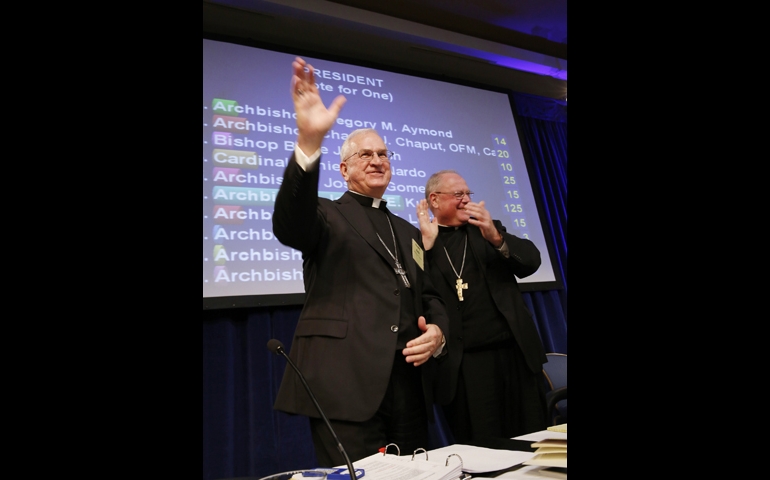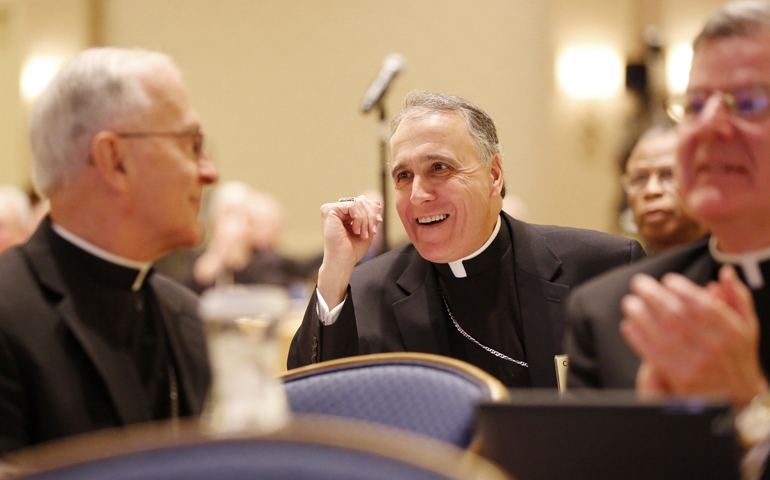USCCB Returns to Tradition with Election of New President, Vice President
By Joshua J. McElwee
Returning to a tradition they broke three years ago, the U.S. bishops elected Tuesday morning as their new president the sitting vice president of the bishops' conference, Archbishop Joseph Kurtz of Louisville, Ky. The bishops elected Kurtz on the first ballot Monday by a 53 percent majority: 125 votes of the 236 cast. The next closest prelate in the running was Galveston-Houston Cardinal Daniel DiNardo, who received 25 votes. Philadelphia Archbishop Charles Chaput received 20 votes. Following Kurtz's election, the election of the bishops' vice president entered into a third ballot runoff between Chaput and DiNardo. The Texas cardinal won, receiving 63 percent on that ballot: 147 votes to Chaput's 87. Tuesday's election means the Kentucky archbishop takes the reins of the bishops' conference from New York Cardinal Timothy Dolan, who has led the conference for the last three years. The formal handover occurs Thursday afternoon at the end of the bishops' annual assembly, being held this week in Baltimore. Kurtz takes over the key role, in which he will act as the public face and voice of the nation's some 445 active and retired bishops as the prelates and the wider Catholic population are adjusting to the new tone and emphases of Pope Francis. Dolan was elected as the bishops' president in 2010 over the bishops' then-vice president, Bishop Gerald Kicanas of Tucson, Ariz. Dolan's election was the first time in the modern history of the conference that a sitting vice president on the presidential ballot was not elected president. Dolan's three years as the leader of the conference were marked by a particular focus on the bishops' fight against the Obama administration's implementation of the health care law, which the cardinal repeatedly said did not leave enough room for Catholic employers from providing contraceptive services. A native of Pennsylvania, Kurtz comes from a background in social work and provision of social services. The archbishop led the Allentown, Pa., diocese's social service agency for a decade and was the diocese's coordinator for health affairs for seven years before being called to the episcopate in 1999. He first served as bishop of Knoxville, Tenn., before becoming Louisville's archbishop in 2007. Jim Wayne, a representative at Kentucky's House of Representatives who has worked with Kurtz on several legislative issues, said in phone interview Tuesday he thinks the archbishop is "a man who attempts to do the right thing as he sees it." Wayne said Kurtz has a "remarkable sincerity" but he is sometimes stiff in public. "The concern that many of us have about Archbishop Kurtz is that he has not be able to unleash his warmth and ... and help Catholics who are alienated feel that they're included," Wayne said. DiNardo's election as the bishops' vice president Tuesday poises the cardinal to take the leadership spot from Kurtz in three years should the bishops continue to follow the tradition they broke in 2010. Chaput's election to the vice presidential spot would have been a barometer on how the American prelates are responding to Pope Francis. The Philadelphia archbishop said in a July NCR interview that people in the right wing of the church "have not been really happy" with Francis' election. DiNardo, the first cardinal from Texas, was elected last year to lead the bishops' committee on divine worship. His election as vice president means the bishops will need to choose a new prelate for that post. DiNardo is also a former chairman of the bishops' pro-life committee, which he led from 2009 to 2012. Kurtz takes over the president's role at the conference as the American prelates consider the tone of the new pontificate. The conference may also take on more important roles in governing the church in the country. In outlining his planned reforms of the Vatican's central bureaucracy, Pope Francis has mentioned several times that bishops' conferences around the world may be given more authority to deal with matters facing Catholics in their countries. "It could well be that in the next three years ... that the principal task of the conference will be changing from a fraternal convening of mostly like-minded people on issues of consequence to some kind of preparing for a judicial role," St. Petersburg, Fla., Bishop Robert Lynch said in an October interview. Among issues analysts say could come in the conference's purview in coming years are canonical decisions on annulments for divorced and remarried couples and more direct handling of issues of clergy sex abuse. Besides their top leadership posts, the bishops also voted Tuesday for new leaders of six of their committees, including Catholic education, ecumenical and interreligious affairs, and international justice and peace. The closest vote was over leadership of the bishops' committee on child and youth protection. Juneau, Alaska, Bishop Edward Burns won that post in a 118-114 vote over Syracuse, N.Y., Bishop Robert Cunningham. Las Cruces, N.M., Bishop Oscar Cantu was elected head of the international justice and peace committee in a 126-110 vote over Rockford, Ill., Bishop David Malloy. The bishops also voted 226-5 on Tuesday to ask the conference to draft a formal statement on pornography. [Joshua J. McElwee is NCR national correspondent. His email address is jmcelwee@ncronline.org Follow him on Twitter: @joshjmac]
|
.
Any original material on these pages is copyright © BishopAccountability.org 2004. Reproduce freely with attribution.

